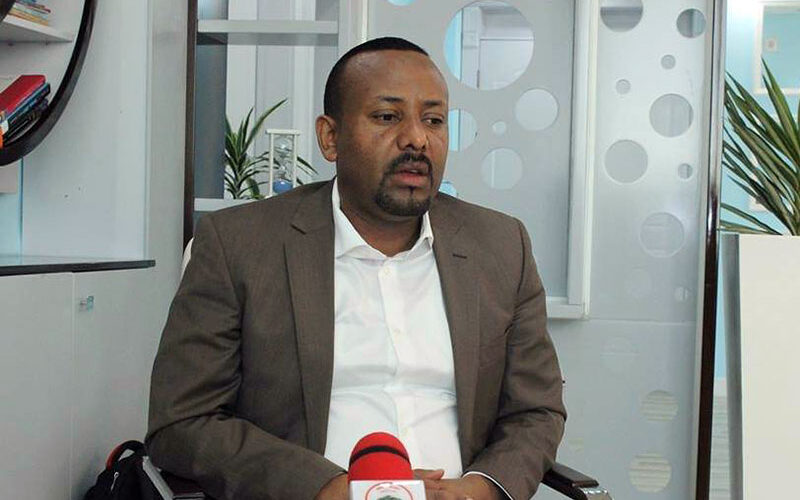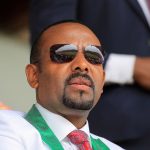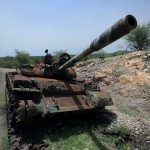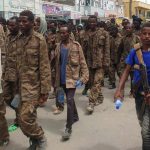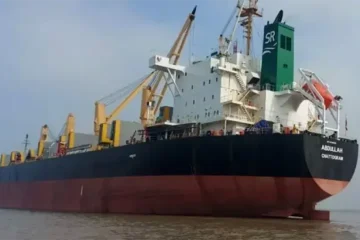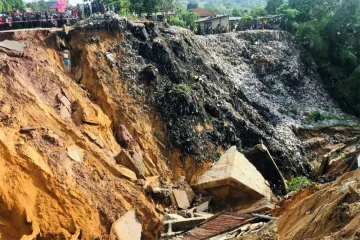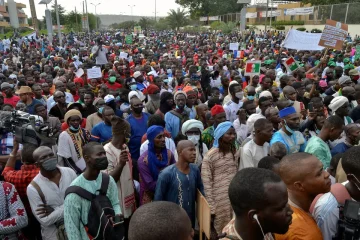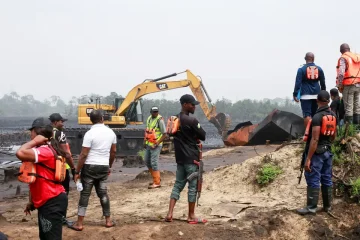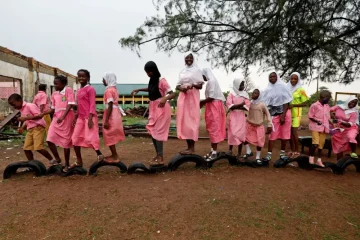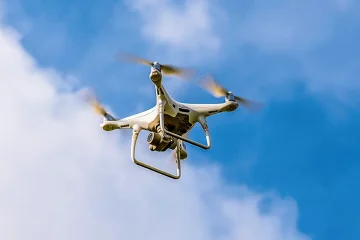THE Ethiopian Air Force has bombed arms depots and destroyed military hardware in the northern Tigray region, Prime Minister Abiy Ahmed said.
The strikes hit sites in and around the regional capital Mekelle and destroyed heavy artillery including rocket launchers, Abiy said in a statement broadcast by state-affiliated Fana.
Abiy, who won last year’s Nobel Peace Prize, launched a military campaign on Wednesday against the Tigray People’s Liberation Front (TPLF), which dominated politics in the country until he came to office in 2018.
Ethiopia’s leader justified his decision to launch a war in the north of the country, saying on Friday it was necessary to disarm a powerful ethnic faction that had oppressed the country for decades and whose leaders were fugitives.
Ahmed, who won last year’s Nobel Peace Prize, said the campaign had “clear, limited and achievable objectives”.
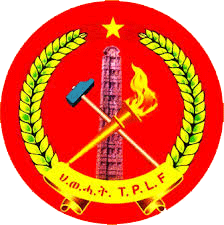
Abiy’s government is mobilising troops from around the country and sending them to Tigray after two days of clashes between federal forces and the Tigray People’s Liberation Front (TPLF), long the most powerful political force in the country.
The operations sought “to restore the rule of law and the constitutional order, and to safeguard the rights of Ethiopians to lead a peaceful life wherever they are in the country,” Abiy said.
A key objective was to “disarm any security force of the regional state,” the prime minister’s office added in a statement that accused the TPLF of hiding in the regional capital Mekelle and “using the civilian population as human shields”.
“Members of the TPLF, who ruled the country for the previous 27 years through means of oppression rather than law, have been fugitives from justice,” it said, adding that those suspected of illegal activities would be detained.
TPLF officials were not immediately available for comment.
The TPLF took power in Ethiopia in a revolution in 1991 and ruled as the most powerful faction in a multi-ethnic coalition until 2018, when Abiy took office. The prime minister has since reorganised the coalition into a single ruling party, which the TPLF refused to join.
Diplomats have tried to push the sides towards negotiations this week to prevent a civil war.
“The stability of Ethiopia is important for the entire Horn of Africa region. I call for an immediate de-escalation of tensions and a peaceful resolution to the dispute,” U.N. Secretary-General António Guterres said in a message on Twitter late on Thursday.
Abiy, who has tried to open up what has long been one of the most restrictive political systems in Africa, won the Nobel Prize for ending a conflict with neighbouring Eritrea. But he has failed to tamp down ethnic violence in a country divided into regions run by powerful local chiefs.
Sporadic sounds of shelling could be heard from Abdurafi town, near the border between Tigray and the neighbouring Amhara region, at 3 a.m local time (0000 GMT) on Friday, a humanitarian worker in the area told Reuters.
Two Ethiopian fighter jets were seen flying over Mekelle, the capital of Tigray, on Thursday afternoon, two diplomatic sources told Reuters, in what was described as a show of force by the Ethiopian National Defence Forces.
The Tigray regional administration, which is led by TPLF chairman Debretsion Gebremichael, has said it is well equipped to deal with an attack from any direction.
It said this week that it had taken over assets of the national defence force’s northern command, one of the most heavily armed parts of the force, based in Tigray. Two diplomats and a regional military officer said the claim was credible.
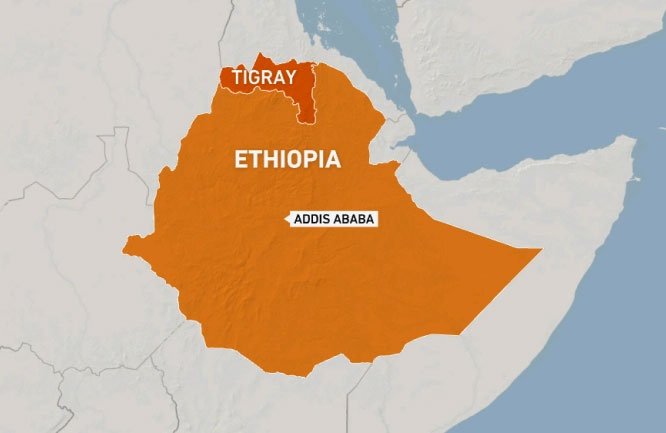
“(The) conflict could test the national military’s cohesion, putting particular stress on the Northern Command, which is based in Tigray,” the International Crisis Group think tank said in a briefing.
Federal troops are being helped by local forces from Amhara, its regional president, Temesgen Tiruneh, said in a Facebook post on Thursday. The two regions have been locked in a boundary dispute.
TIMELINE-Key events leading to Ethiopia’s crisis in Tigray
May 1991 – The Ethiopian People’s Revolutionary Democratic Front (EPRDF) topples Colonel Mengistu Haile Mariam, head of a Communist junta that ruled the country from 1974. The coalition is led by the Tigray People’s Liberation Front (TPLF), guerrilla fighters who marched from their homeland in Ethiopia’s north to the capital Addis Ababa.
August 1995 – The Federal Democratic Republic of Ethiopia is proclaimed. The EPRDF sweeps to power in poorly contested elections, and TPLF leader Meles Zenawi becomes Ethiopia’s first prime minister. Tigrayans dominate senior ranks of government.
1995 to 2012 – Meles introduces a system of ethnic federalism, giving the country’s main ethnic groups the chance to govern the areas in which they dominate. Though Tigrayans make up about 5% of the population, they benefit disproportionately, other regions complain, as roads and other infrastructure are built in their sparsely populated area.
August 2012 – Meles dies in office. A prime minister from another ethnic group is appointed.
2015 to 2018 – Divisions break out in the EPRDF over how quickly to pursue political reforms in response to street protests that threaten the coalition’s grip.
April 2018 – Abiy Ahmed, an Oromo, takes over as prime minister, winning praise at home and abroad for opening up one of Africa’s most restrictive political and economic systems.
2019 – Tigrayans complain they are persecuted in a crackdown on corruption and past abuses. Former senior military and political officials are put on trial.
October 11, 2019 – Abiy is awarded the Nobel Peace Prize for his peacemaking efforts, which ended two decades of hostility with Eritrea. The TPLF continue to view Eritrea as an enemy.
November 21, 2019 – Ethiopia’s ruling coalition agrees to form a single party, but the TPLF refuses to merge with three other ethnic-based parties, calling the move rushed and undemocratic.
September 8, 2020 – Tigray holds regional elections in defiance of the federal government, which postponed nationwide polls due in August because of COVID-19. Abiy’s government says the vote is illegal.
October 2020 – The federal government starts to withhold some funds meant for social welfare programs in Tigray, part of a plan to starve the regional authorities of cash in retaliation for September’s vote.
November 4, 2020 – Abiy sends troops into Tigray, accusing the TPLF of attacking federal troops based in the region. The TPLF accuses Abiy of punishing the region for the September vote.

